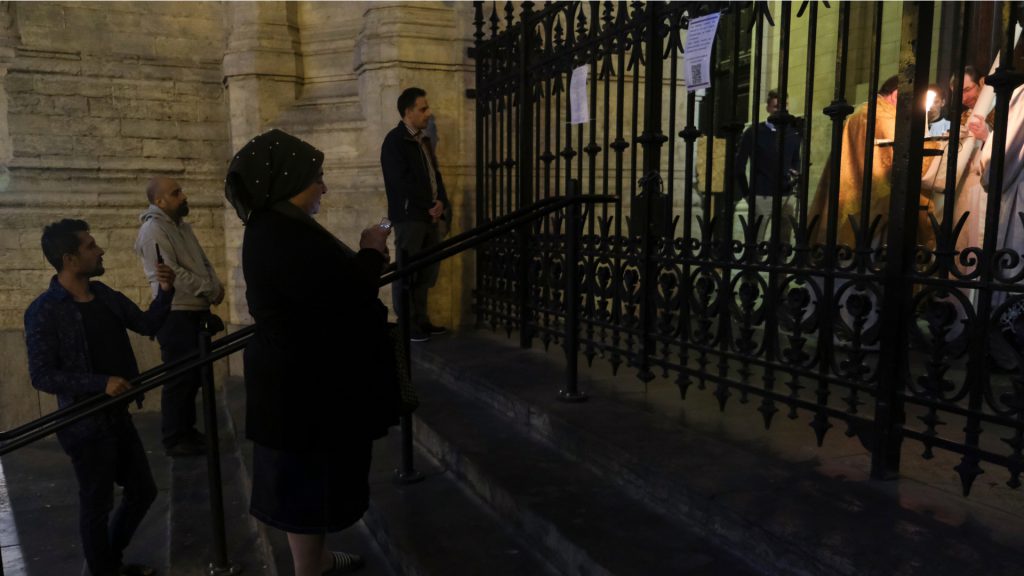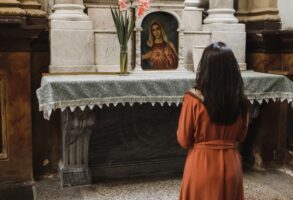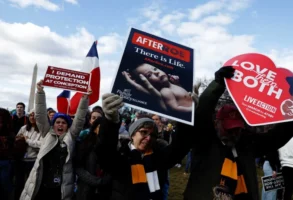
Published April 12, 2020
At the beginning of Holy Week one year ago, we watched in horror as the Cathedral of Notre Dame in Paris seemed to be going up in smoke right before our eyes. Though the damage didn’t end up being as catastrophic as we feared, what I wrote at the time, while the church was still lit up with flames, is a poignant reminder as we face an entirely different sort of tragedy this Easter:
Watching this holy place slowly collapse at the start of Holy Week — which will culminate in the commemoration of Jesus’s passion, death, and resurrection — is of undeniable significance. Notre Dame has fallen, the way everything in the earthly city must. She will not rise from these ashes as she was.
As I reread these words this week, and as we prepare for a Triduum without public Masses or our typical celebrations, they take on new significance. For Catholics, this Lent has asked far more of us than we’re accustomed to. Giving up the snooze button or a morning cup of coffee pales in comparison to losing access to everything our churches offer, especially at a time of year when we commemorate the centrality of the sacraments in a particular way.
Though many priests and parishes have developed clever ways of hearing confessions, continuing to host Adoration, or livestreaming daily Masses, there’s not much that can compensate for the fact that most U.S. Catholics will celebrate Easter, the most important holy day of our faith, without the Eucharist. For many, experiencing this time of year without extended family or a parish community might be a particular type of hardship.
That we are living through this crisis during Lent and Easter not only helps us better understand the trials facing our country but also brings new light to the truth of what these liturgical seasons mean.
It is an invitation, first of all, to recall the suffering of the Church around the world, to unite our much smaller trials with those who live with little access to the sacraments, who face imprisonment, torture, and death for practicing the faith. As we celebrate this Sunday in our homes, let’s recall in a special way the Christians who have lost their lives in terrorist attacks, targeted for their worship on Easter Sunday.
Think of the suicide bombing orchestrated by the Taliban in March 2016, which killed at least 72 Pakistani Christians as they celebrated Easter. In 2017, the attack came in Egypt the week before Easter, as two ISIS suicide bombings at Christian churches killed at least 45 people and injured more than 100 others at their Palm Sunday services. Just last year on Easter, Islamic terrorists conducted several bombings in Sri Lanka, including at three churches during Mass. More than 250 people were killed.
In comparison with these attacks, our small complaints hardly seem worth mentioning. This season of being asked to go without some of our usual routines and comforts — even those as essential as the Eucharist — should remind us of the blessings we often take for granted and encourage us in the future to be more grateful for the freedom, safety, and plenty that we have as Catholics in the U.S.
On a deeper level, the spiritual significance of Lent and Easter take on new meaning in light of the current tragedy. At the start of Lent, we are marked with ashes and called to remember that we are dust and to dust we shall return. What is this period of sickness and suffering, if not a painful reminder that the world is not our final home and death cannot be put off forever?
Throughout Lent, we are asked to renounce our own will so that we might better conform ourselves to what God asks of us. Watching our country buckle under this virus has offered us a new lens through which to see that it is God, not us, who controls our fate. We are asked to cooperate with Him and to make the best available choices in our given circumstances, but ultimately, it is His plan, not ours, that is being worked out in the world. The loss, anxiety, and loneliness of this time is the price of the Fall, yet His promise remains: He will work all things to our good.
With that in mind, we mark a strange Last Supper, Good Friday, and Easter this year, perhaps more conscious than we’ve ever been of the fact that life lies beyond the grave. Jesus refused to spurn His Passion and death, and by taking up the cross, He showed us how to shoulder suffering. By taking our sins on Himself, he carried all the sufferings of the history of the world with Him to the place where He was crucified. And by rising on Easter morning, He transfigured and redeemed our pain, our misery, our grief.
With His resurrection, He gave the world the most powerful sign it has ever seen that death is but a beginning. But there can be no resurrection without the cross. This Easter, mired in this present suffering, let us remember more than ever our call: to suffer with Him, and so to rise.
Alexandra DeSanctis is a staff writer for National Review and a visiting fellow at the Ethics and Public Policy Center.





